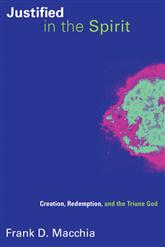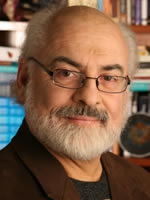Frank Macchia’s Justified in the Spirit, reviewed by John Poirier
 Frank D. Macchia, Justified in the Spirit: Creation, Redemption, and the Triune God (Grand Rapids: Eerdmans, 2010), 360 pages, ISBN 9780802837493.
Frank D. Macchia, Justified in the Spirit: Creation, Redemption, and the Triune God (Grand Rapids: Eerdmans, 2010), 360 pages, ISBN 9780802837493.
Justified in the Spirit is a sophisticated attempt to do what its title suggests: to find an increased role for the Spirit within the Christian doctrine of justification. The book represents a bringing together of a number of different perspectives—including those that derive primarily from centuries of tradition, along with more recent insights from biblical scholarship. The book moves through discussions of the shape of soteriology within different streams of tradition (Catholic, Lutheran, Calvinist, Pentecostal, etc.), and combines these with significant contributions from well known theologians. Although Macchia is a theologian himself, he pays more attention to the fruits of New Testament scholars than many other theologians working today.
One of the book’s main arguments is summed up on p. 53: “Participation in Christ is first and primarily a pneumatological reality as believers are caught up in the communion of the Spirit with Christ and, through Christ with the heavenly Father.” This sentence says a lot. One of the book’s main aims seems to be to forge links between aspects of soteriology and Trinitarian language.
Many of the main features, it must be said, are indicative of the age in which this book was written: it is certainly vogue to be “broadly Trinitarian, ecclesiological, and eschatological” (a description found on the back cover). While there may a proper place to be “Trinitarian”, the way in which that call has been handled in recent years has been a little over the top, as it sometimes seems as if one’s handling of any given doctrine can somehow be graded on how great a role it assigns to each member of the Trinity. It is almost as though theologians are afraid to leave out one of the members of the Trinity in any given discussion, even when the topic (e.g. hermeneutics) does not have a natural bearing on the doctrine of the Trinity. This danger seems to be somewhat greater among Pentecostals, as some appear to have a strong desire to bring the Spirit into doctrines in which the Spirit arguably does not belong.
Does Macchia do that here? It is difficult to say. His discussion is at all places carefully researched, and his arguments are never fleeting or forced. Although he never gives the keys (so to speak) to NT scholarship, he does listen to it intently and with a genuine openness. And yet the question remains whether Macchia accomplishes a pneumatological orientation of the doctrine of justification simply by construing “justification” more broadly than others do, by allowing it to include (rather than lead to) the fruit of the spirit-filled life. The same could be said of how Macchia achieves his heightened emphasis on the role of the spirit-filled community. Both of these concerns naturally belong within a theology, but are they really a part of justification per se? Macchia evidently disagrees with the habit of identifying “justification” with a forensic aspect of salvation, and identifying the other aspects of salvation with other terms. Yet he writes as if the term “justification” must apply to all aspects of salvation—including justification per se, sanctification, and redemption. (See esp. pp. 204–5.) Macchia is not alone in this, but it is still unfortunate that he does not explain why he takes this approach.



